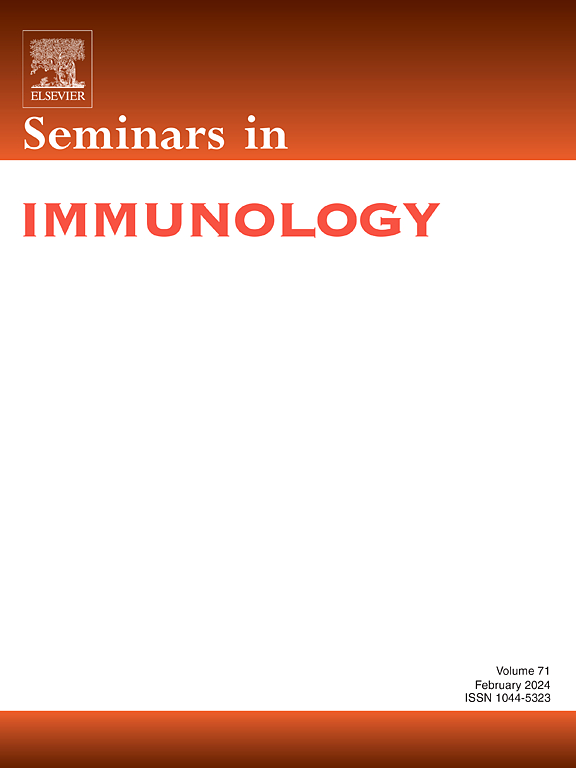先天免疫之外的干扰素调节因子3:肥胖和代谢紊乱的调节
IF 7.4
2区 医学
Q1 IMMUNOLOGY
引用次数: 0
摘要
干扰素调节因子3 (IRF3)是一种转录因子,主要通过调节I型干扰素(ifn)在抗病毒免疫中发挥作用。最近的研究扩大了它的意义,包括代谢紊乱,特别是肥胖和糖尿病。肥胖的特点是慢性低度炎症、胰岛素抵抗和代谢功能障碍,所有这些都被越来越多地发现与免疫信号通路有关。IRF3已成为肥胖和2型糖尿病(T2D)发展的重要调节因子,主要通过调节脂肪组织中各种细胞的炎症细胞因子产生。在肥胖个体中,IRF3在脂肪细胞和脂肪组织巨噬细胞中被激活,促进炎症因子的表达,从而导致慢性炎症,加剧胰岛素抵抗。此外,IRF3与肝脏疾病中的线粒体功能障碍有关,进一步放大了与肥胖相关的代谢应激和失衡。越来越多的证据表明,IRF3在免疫和代谢途径中都是一个重要的介质,这突出了它作为治疗肥胖相关炎症和代谢功能障碍的治疗干预措施的潜力。本文章由计算机程序翻译,如有差异,请以英文原文为准。
Interferon regulatory factor 3 beyond innate immunity: Regulation in obesity and metabolic disorders
Interferon regulatory factor 3 (IRF3) is a transcription factor known primarily for its role in antiviral immunity via regulation of type I interferons (IFNs). Recent research has broadened its significance to encompass metabolic disorders, particularly obesity and diabetes. Obesity is characterized by chronic low-grade inflammation, insulin resistance, and metabolic dysfunction, all of which are increasingly found to be associated with immune signaling pathways. IRF3 has emerged as an important regulator in the development of obesity and type 2 diabetes (T2D), predominantly through its regulation of inflammatory cytokines production in various cells in adipose tissue. In obese individuals, IRF3 is activated in the adipocytes and adipose tissue macrophages, to promote the expression of inflammatory cytokines, thereby contributing to chronic inflammation and exacerbating insulin resistance. Moreover, IRF3 has been linked to mitochondrial dysfunction in hepatic disorders, further amplifying metabolic stress and imbalances associated with obesity. The growing evidence suggests that IRF3 is an important mediator in both immune and metabolic pathways, highlighting its potential as a target for the development of therapeutic interventions for obesity-related inflammation and metabolic dysfunction.
求助全文
通过发布文献求助,成功后即可免费获取论文全文。
去求助
来源期刊

Seminars in Immunology
医学-免疫学
CiteScore
11.40
自引率
1.30%
发文量
50
审稿时长
89 days
期刊介绍:
Seminars in Immunology is a specialized review journal that serves as a valuable resource for scientists in the field of immunology. The journal's approach is thematic, with each issue dedicated to a specific topic of significant interest to immunologists. It covers a wide range of research areas, from the molecular and cellular foundations of the immune response to the potential for its manipulation, highlighting recent advancements in these areas.
Each thematic issue is curated by a guest editor, who is recognized as an expert in the field internationally. The content of each issue typically includes six to eight authoritative invited reviews, which delve into various aspects of the chosen topic. The goal of these reviews is to provide a comprehensive, coherent, and engaging overview of the subject matter, ensuring that the information is presented in a timely manner to maintain its relevance.
The journal's commitment to quality and timeliness is further supported by its inclusion in the Scopus database, which is a leading abstract and citation database of peer-reviewed literature. Being indexed in Scopus helps to ensure that the journal's content is accessible to a broad audience of researchers and professionals in immunology and related fields.
 求助内容:
求助内容: 应助结果提醒方式:
应助结果提醒方式:


